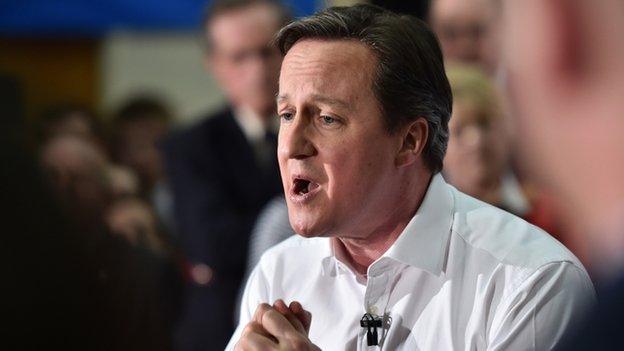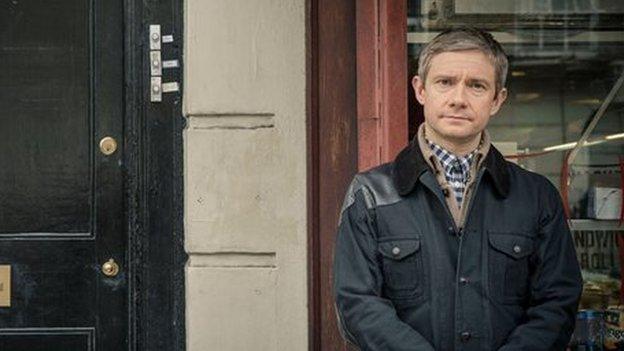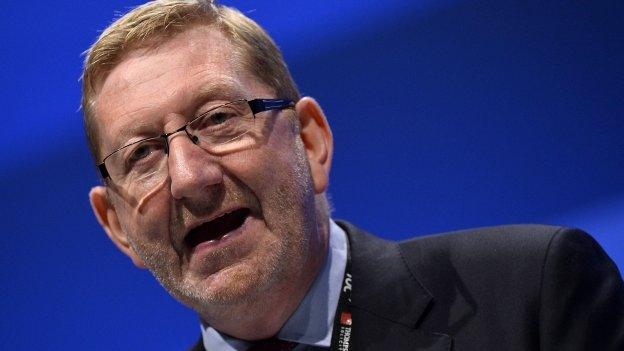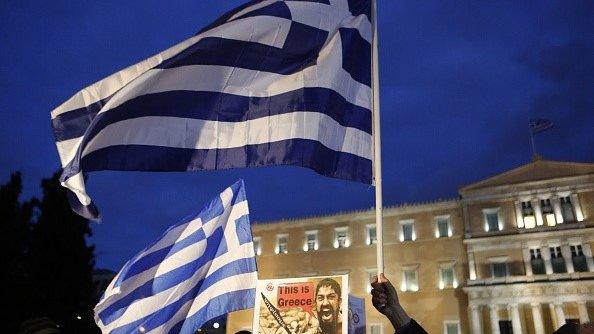Election 2015: Parties play up the tribal rhetoric
- Published

David Cameron at the election rally in the Wiltshire town of Chippenham
There are still tribes in British politics.
They may have weakened as voters increasingly act like consumers, happy to switch brands.
But the tribes can still be spotted - groups that could only belong in one political party.
They were there on Monday in Chippenham where David Cameron chose to make the first stump speech of his campaign.
It could have been a country fair or an auction room in the Wiltshire town.
This was the tribe and they visibly brightened when he spoke of "moaning, left-wing commentators" and referred to the Labour leader Ed Miliband as "the man who forgot to mention the deficit".
Going personal
All political parties need to shore up their base. And even though politics may have changed, the old visceral caricatures still have potency.
So Mr Cameron has quite deliberately gone personal, external.
"When it comes to who's prime minister, the personal is national," he says.
Labour is depicted as a "bunch of hypocritical, holier-than-thou, hopeless, sneering socialists… the same old condescending, bossy, interfering we-know-best attitude of the Hampstead socialist down the ages".

The actor Martin Freeman is supporting Labour
In many political cultures, politicians go after the metropolitan liberal elite.
In France the centre right mocks rich leftists as the gauche caviar.
In the US, the Republicans scornfully denounce the Washington insiders who "know best".
Although Labour has said it will refrain from personal attacks, it portrays Mr Cameron's government as for "the few at the top".
After the Budget, the Labour leader Ed Miliband said, external "it's a recovery for the few from a government of the few".
Many Labour supporters like to portray the Conservatives as a party of rich donors, backed by the heavy pockets in the City or by those who live "offshore".
As Len McCluskey, external, general secretary of the Unite union, said: "If you're a hedge fund, a wealthy retiree or a business shy of providing fairly paid, secure employment, [the Chancellor George] Osborne's Britain is the place for you."
'Rollercoaster of cuts'
On Monday the actor Martin Freeman came out in support of Labour and said "it was a choice between two completely different sets of values".
The Tories, he said, would "take us on a rollercoaster of cuts".
As Andrew Rawnsley recently wrote in the Observer, both parties "campaign as if they are still back in the 1950s when it really was a two-horse race".
In 1955, the Conservatives and Labour took 96% of the vote. This time round they are each struggling to hold on to a third of votes cast.
The same trend is happening in Europe.
In 1980 an average of 9.8% of the electorates in 13 established democracies were party members.
By the end of the 1990s that figure had almost halved. And the trend has accelerated.
As Peter Mair noted in his book Ruling the Void, voters since the 1980s "appear increasingly accidental or even random.
"There is a world of the parties, or a world of political leaders, that is separate from the world of the citizenry."
All over Europe, citizens are moving away from the established political parties - but the election campaign is still pitched as if the old world continued.
Choice of two
Tribal loyalties may be weakening but Mr Cameron is keen to point out that the choice of prime minister is between him and Mr Miliband.
So the core of the Conservative campaign - as underlined in Chippenham - is to portray Labour as about "more taxes, more spending and more debt", with the line: "Don't put it [the recovery] at risk".

The Unite union leader Len McCluskey has been attacking the Conservatives
Labour also comes with its warnings; of a Tory party set to reduce the size of the state to the smallest in 80 years; of a recovery that has not reached ordinary people; of a Tory party too dangerous to be left in charge of the National Health Service for five more years.
The reality is that the differences between the two main parties are relatively small.
They are both hemmed in by economic reality.
Both recognise there is a funding gap of £30bn that will have to be filled one way or another.
Both parties have ring-fenced the health and education budgets.
In broad terms, Labour says it will cut less than the Tories, and the Tories say they will tax less than Labour.
Deepen the doubts
If the foundation stones are similar, it becomes even more important to find differences, to demand that your opponent reveals precisely where their cuts in welfare spending will fall.
In a tight race, part of the campaigning will be to embed the caricatures, to deepen the doubts.
Much voting comes down to a gut instinct.
The political parties are trying to sow broad messages: "Don't risk the recovery"; or end a government "for the few".
Part of implanting those broad themes is often to go personal.
The public may say they do not like it but it has long been part of politics.
- Published19 February 2015

- Published17 February 2015
- Published17 February 2015